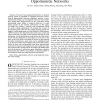Free Online Productivity Tools
i2Speak
i2Symbol
i2OCR
iTex2Img
iWeb2Print
iWeb2Shot
i2Type
iPdf2Split
iPdf2Merge
i2Bopomofo
i2Arabic
i2Style
i2Image
i2PDF
iLatex2Rtf
Sci2ools
TWC
2016
2016
Secure Routing Based on Social Similarity in Opportunistic Networks
—The lack of pre-existing infrastructure or dynamic topology makes it impossible to establish end-to-end connections in Opportunistic Networks (OppNets). Instead, a storeand-forward strategy can be employed. However, such looselyknit routing paths depend heavily on the cooperation among participating nodes. Selfish or malicious behaviors of nodes impact greatly on the network performance. In this paper, we design and validate a dynamic trust management model for secure routing optimization. We propose the concept of incorporating social trust into the routing decision process and design a Trust Routing based on Social Similarity (TRSS) scheme. TRSS is based on the observation that nodes move around and contact each other according to their common interests or social similarities. A node sharing more social features in social history record with the destination is more likely to travel close to the latter in the near future and should be chosen as the next-hop forwarder. Furthermore,...
TWC 2016 |
Related Content
| Added | 11 Apr 2016 |
| Updated | 11 Apr 2016 |
| Type | Journal |
| Year | 2016 |
| Where | TWC |
| Authors | Lin Yao, Yanmao Man, Zhong Huang, Jing Deng, Xin Wang |
Comments (0)

